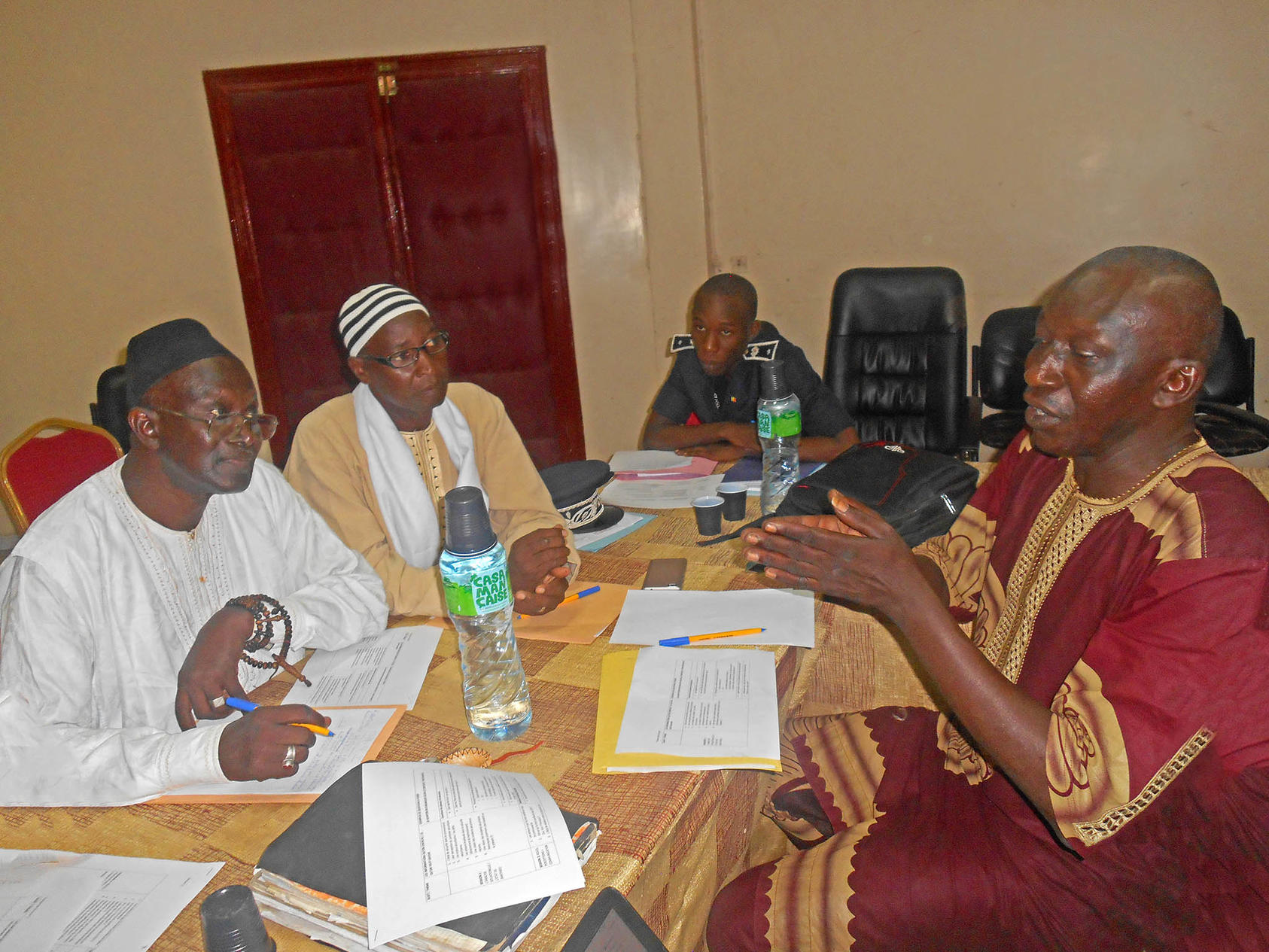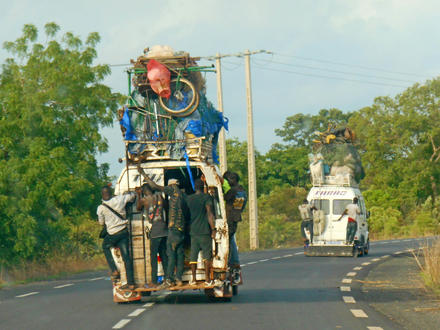In Senegal’s War-Torn Casamance, a Dialogue Builds Stability
A small town shows how to build the peace that can boost Senegal’s stabilizing role in West Africa.
Senegal, one of West Africa’s most stable countries, is a key partner in countering extremism, military coups and other violence in the Sahel and in coastal states. Yet Senegal’s democracy and stability face challenges, notably the 40-year insurgency in the Casamance region. As Senegal attempts political and security reforms to build peace there, a community dialogue process in one Casamance town is helping improve security. Local dialogues—among communities, government officials and security forces—offer an efficient method for Senegal and its partners to heal conflict, bolster Senegal’s stability and counter West Africa’s slippage toward violence.

A Way to Bolster West Africa’s Stability
Why should policymakers attend to the long-festering violence in Casamance, the southern finger of Senegal, squeezed between Gambia and Guinea-Bissau? Those countries suffer human displacement and crime generated by Casamance’s war, so peace in this conflict would directly benefit three West African states. Consolidating stability in Casamance would bolster Senegal as a U.S. partner in building peace in West Africa, a formal U.S. policy goal. As extremist violence and coups spread from the Sahel to coastal West Africa, Senegal is the one state among 15 in its region that has never suffered a military coup. It is a major contributor of U.N. peacekeeping forces. Yet its democracy has suffered setbacks since 2000, and its stability depends on bolstering governance that is responsive to public needs. That process requires anti-corruption reforms, a more independent judiciary and an end to the Casamance insurgency, which still displaces tens of thousands of people, seeds farmlands with explosives and crimps Senegal’s economy.
Recent years offer greater hope for ending Casamance’s violence. President Macky Sall’s administration has pursued security reforms and negotiations with the disparate rebel factions, one of which signed a peace accord August 4 that is likely to further the insurgency’s decline. This “from-the-top-down” effort is essential, yet insufficient, to bring real peace; fighting continues to uproot residents and recently spilled anew into Gambia.
But a small district capital on the Casamance River, the fishing and farming town of Goudomp, has built a “from-the-bottom-up” peace effort that is complementing the government’s security reforms and reducing crime and insecurity. It has built a base of trust and cooperation between the local community and authorities that, critically, does not exist elsewhere in Casamance.
In general, Casamance’s two million people fear the army and police, regard them as callous outsiders and avoid contact with them as much as possible. That divide obstructs efforts to end the war; reduce endemic, organized crime; restore displaced people to their homes; and build economic growth and stability. Goudomp is showing that a well-organized process of local dialogues helps remove this barrier.
Casamance’s Long, Destructive War
Casamance’s war is rooted largely in its marginalization from the rest of Senegal over many years. A farming region just smaller than Rwanda or Haiti, Casamance is separated from the bulk of Senegal by the absurd colonial borders drawn by France, Britain and Portugal beginning in the 1800s. Senegal’s main bulk is an extension of Africa’s arid Sahel, dominated culturally and politically by Islam and the ethnic Wolof community. Casamance is a sub-tropical, riverine rice-farming and fishing region populated by people of various ethnicities, and with a significant Christian minority. Its people, about 12 percent of Senegal’s population, feel isolated and often forgotten by the national government.
When street protests erupted in the early 1980s, security forces suppressed them with extreme brutality. A political organization, the Movement of Democratic Forces of Casamance (MFDC by its French initials), revived old demands for independence and launched a guerrilla insurgency that reached its peak in the 1990s. The war has since flared episodically, with repeated ceasefires, negotiations and new cycles of violence. Authorities have made peace with some MFDC factions and wage offensives against hardliners—one in the dense forests near Goudomp last year and another this year near the Gambian border.
Decades of war have left Casamance’s people mistrustful of soldiers, police and rebels. As is typical in such conflicts, many sides in the Casamance dispute have been accused of abusing human rights. The MFDC has lost much of its former public support as many of its fighters have turned to smuggling of timber or cannabis, banditry and other crimes.
Over years, the violence has uprooted an estimated 150,000 people, of whom tens of thousands remain displaced, either within Senegal or in Gambia or Guinea-Bissau. The latest round of fighting, in March, displaced 6,000 more Casamance and Gambian residents along the border, Gambian officials said. Across Casamance, hundreds of vegetable, fruit and rice farms, and dozens of villages, stand abandoned and weed-grown, many unusable because of scattered landmines that have killed or injured hundreds of people over decades. Casamance’s stagnation in a state of “neither war nor peace” has fatigued residents, many of whom struggle simply to survive. Unemployment, officially estimated at 30 percent across rural Senegal at the end of 2021, tends to run higher in Casamance than nationally. Insecurity prevents young people from creating livelihoods on which to support themselves and build families, so many young people flee to Dakar or toward Europe to seek their futures.
Community Dialogue Bolsters Peace
Amid the elevated violence in many nearby states, Senegal has begun reforms to strengthen security at its borders, and to coordinate the intelligence work of the police, gendarmerie, army and government ministries. The Sall administration introduced national reforms to modernize the army and police, including a new agency to work with police, government officials and residents on ways to improve community security. In Casamance, these reforms have shifted many security duties from the army to the gendarmerie, or rural police, reducing “militarized” security procedures such as army checkpoints on roads and army bases in towns. Critically, in a region where residents refer to the army as “the great mute,” the reforms include unprecedented efforts to communicate with the population. The former national gendarmerie commander, General Jean-Baptiste Tine, vowed in a visit to Casamance in 2020 to “promote the concept of local policing, which calls for more collaboration and consultation with fellow citizens.”
But people’s mistrust and avoidance of soldiers and police is deep—a universal finding of dozens of interviews with residents and other research by USIP and a civil society group, Dynamique de Paix en Casamance, in localities across the region. Goudomp, next to a large forested area where rebels remained active, suffered heightened violence, drug and arms trafficking, cattle theft, carjackings and robbery. USIP chose Goudomp as the site for a Justice and Security Dialogue—a process developed by the Institute to rebuild cooperation and peace in regions brutalized by warfare.
The dialogue gathered security officers and government officials with Goudomp’s religious and traditional leaders and other community members, including representatives of women, farmers, traders, and displaced people. “Everyone sitting together,” said Goudomp Mayor Malang Vieux Cissé. “Generally, we do not have that. For some people, it was the first time.” Many in Goudomp, as across Casamance, distrust security forces so deeply that they would not imagine even calling them to report seeing a crime. Yet as the group held regular discussions about the security problems they shared—and needed each others’ help to solve—changes began. Security officers offered their cellphone numbers and community members began sharing information and concerns. Since 2019, even with the interruptions of COVID, the dialogues have yielded improvements:
- Community-police cooperation. In the six months before the dialogue, gendarmes reported receiving three calls from residents to inform them of security problems. After the dialogues began, the rate of calls quickly tripled—and officers say such communication has continued to improve.
- Reductions in crime. Previously, armed robberies against cashew farmers and traders in Goudomp’s market had been running at two to three per month during the cashew harvest (March to June) and other heavy commercial seasons. The dialogue persuaded the traders’ association to coordinate with security forces and even hire people to assist them. The market went almost a year with no robberies.
- A community-built gendarmerie post. When residents learned that logistical problems were complicating the gendarmes’ ability to help the community, town authorities and community members furnished a local office for them, complete with laptop computers.
- A peaceful elections and resolution of local conflicts. The dialogue’s participants mediated a conflict between rival political leaders to reduce tensions in the town that threatened to cause violence around the January 2022 local elections.
Goudomp’s progress reflects a pattern from similar dialogues in Dakar; Jos, Nigeria; and Niamey, Niger. Residents and authorities in Goudomp have now adapted their process to launch security dialogues in six nearby rural townships. Stability in southern Casamance, including Goudomp, also stands to improve following the government’s August 4 peace accord with the MFDC faction led by César Atoute Badiate. The pact is a milestone in part for Badiate’s agreement to disarm his forces in the coming months.
Senegal’s government, and partner governments and organizations can advance peacebuilding in Casamance and Senegal by supporting collaborative security efforts such as Goudomp’s at local and national levels. Goudomp’s increased collaboration among authorities, community and civil society also suggests ways to make future negotiations with MFDC factions more inclusive and productive. Finally, because the security problems of West Africa and the Sahel easily cross national borders, the responses to those problems must do so as well. This principle emerged at a 2021 meeting of Goudomp’s dialogue that was observed by a national guard colonel and police commissioner from the adjacent border district in Guinea-Bissau. Immediately afterward, they asked participants how they might start similar dialogues in their own country.
Boucar Baba Ndiaye is a USIP project officer based in Ziguinchor, Senegal.





